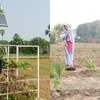Villgro, CEEW launch $2.5-million initiative to support clean energy-based livelihood solutions
The initiative, aimed at uplifting the rural economy, will provide technical and sectoral growth support to at least five enterprises deploying innovative, clean energy-powered livelihood appliances.
Social enterprise incubator Villgro Innovation Foundation recently announced that it has jointly embarked with Council on Energy, Environment and Water(CEEW) on a novel initiative, ‘Powering Livelihoods’, with a vision to bolster India’s rural economy through the scaling up of clean-energy solutions.
The initiative, worth $2.5 million, aims to provide dedicated capital, technical, and sectoral growth support to at least five enterprises which are deploying innovative, clean energy-powered livelihood appliances and shall enable them to undertake large-scale commercial operations over a period of three years.
The initiative boasts of having under its aegis investment partners like Caspian Debt and Upaya Social Ventures, among others.

(Left to Right) Ananth Aravamudan ( Villgro), Wase Khalid ( Ceew), Abhishek Jain( Ceew), Arunabha Ghosh ( Ceo, Ceew), Shankha Lahiri (Villgro), Paul Basil ( Ceo, Villgro), Gowtham Sundara Raju (Villgro)
Speaking on the initiative, Arunabha Ghosh, CEO of policy research institution CEEW, said,
“India alone has more than a $50-billion market for clean-energy solutions for rural livelihoods. ‘Powering Livelihoods’ aims to catalyse the transformation of India's rural economy by scaling up the accessibility and commercialisation of clean energy-based solutions. By marrying CEEW's deep expertise in evidence-based policy formulation and sectoral engagement with Villgro's years of experience in growing businesses, the initiative will be highly significant in terms of capital, capacity building, and ecosystem support to help local enterprises in this domain survive and thrive, while escaping the ‘commercial valley of death’.”
He added, “We also firmly believe that the initiative shall be fruitful in unlocking crucial support from investors, policymakers, etc, as well as gathering evidence to create a tangible and sustainable impact towards India’s rural development and climate change agendas.”
The initiative will offer the following for the beneficiaries:
Non-dilutive capital support: ‘Tranched’ grant support (upto $250,000) to each enterprise to help them kick-off the commercial deployment of their product / appliance and to allow financial leverage for further fundraise in the form of equity / debt.
Capacity-building support: Based on needs assessment, enterprises would be provided support services (upto $100,000) through strategic partnerships. This includes mentoring, capacity building, financial planning and modelling, and assistance on compliance and legal issues, with an end-goal to scale up commercial deployment.
Sectoral growth support: This would create sectoral momentum and create a larger impact by collecting evidence from the deployments at scale and by disseminating the evidence among key stakeholders such as financiers, policymakers, investors, and other market enablers.
1565270545472.png?fm=png&auto=format)
Representational image
The core focus areas of the initiative include the agriculture and allied value chain / cold storage sector, which includes enterprises deploying appliances such as clean energy-powered and / or energy-efficient cold storage, commercial food processors, juicers, dryers, milk chillers, flour mills, milking machines, rice hullers, and oil expellers.
Another area is the textile sector, in which enterprises deploy appliances such as solar charkhas, sewing machines, paddle loom, jute machinery, and silk reelers which could improve productivity and reduce labour-intensive tasks without harming the environment.
This is a much-needed solution for these sectors, as, for instance, most farm machines are still powered by fossil fuels. Similarly, in the highly-intensive textile industry, not many enterprises and business owners have realised the energy use per unit output at the manufacturing level can be reduced and overall cost-cutting along the value chain can be achieved by shifting to an energy-efficient and DRE-powered solution.
According to a recent Yes Bank report, ‘climate resilience’ is increasingly becoming a major sustainability issue for Indian SMEs and small-scale rural industries, which are often negatively affected by fluctuations in energy-related costs, increasing frequency of extreme weather conditions, etc.
(Edited by Athirupa Geetha Manichandar)









